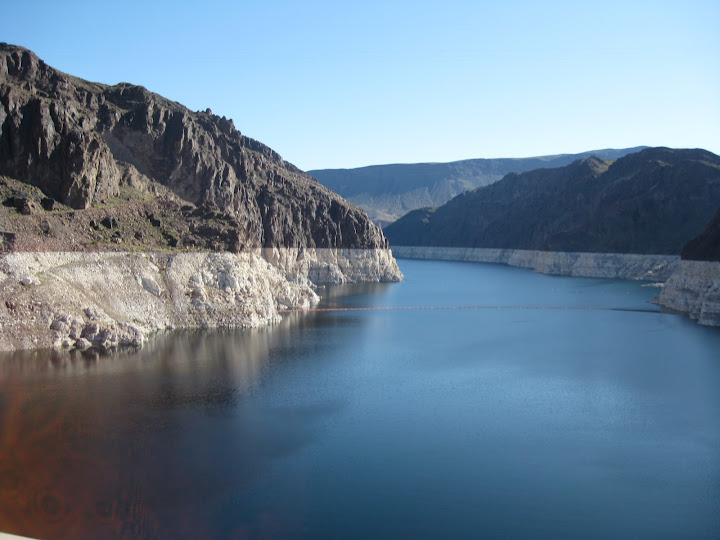My on-again, off-again infatuation with 1083.57, the elevation Lake Mead reached in March 1956, is back on. As Shaun McKinnon reports in this morning’s Arizona Republic, Mead’s at the lowest it’s been since then. The latest “24-month study” from the Bureau of Reclamation (pdf), out this week, is back to forecasting that we’ll drop below those 1956 levels this year, perhaps in October, meaning the Colorado River will be at it’s lowest since it was filled in the 1930s.
1083.57 is arbitrary, a nice bit of history that’s useful for storytelling purposes. But, as Shaun explained, there’s another marker just a bit lower, at 1075 feet above seal level, that is of real deal importance:
Drought-stricken Lake Mead has dropped an additional 10 feet since last summer, and now, Arizona and other Colorado River users are scrambling to keep the reservoir full enough to avoid water rationing.
Before year’s end, the lake will likely sink to within 9 feet of the level that would trigger the first round of restrictions – and the first such restrictions ever on the river. They begin with a reduction in water deliveries to Nevada and Arizona, where farmers would be affected first. (emphasis added)
I still think it’s remarkable that we’ve just had the 11 driest consecutive years on the Colorado and no one has had their deliveries reduced. That suggests, as CAP’s David Modeer suggests in Shaun’s story, that the system is pretty robust.
Mead’s dropping numbers come as no surprise. Another dry year on the Colorado meant minimum releases from Lake Powell while users in the Lower Basin got their full allotments again this year. That means less water in Lake Mead. “We know that it’s being drained,” one of the region’s water managers told me recently.


I still think it’s remarkable that we’ve just had the 11 driest consecutive years on the Colorado and no one has had their deliveries reduced. That suggests, as CAP’s David Modeer suggests in Shaun’s story, that the system is pretty robust.
I’m not sure that I would describe a system that does not even try to manage the water supply until the situation is absolutely critical as ‘robust’.
Pingback: Stuff we linked to on Twitter last week |
@chris: I’m curious. How would you have managed it and what would have been the outcome?
dg